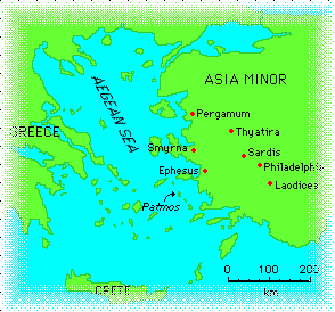 Thyatira,
Revelation 2:18-29
Thyatira,
Revelation 2:18-29  Thyatira,
Revelation 2:18-29
Thyatira,
Revelation 2:18-29
Thyatira, modern Akhisar, is located
42 mi. [67 km.] inland from the Aegean Sea. It is the fourth of the seven churches
addressed by John.
From coins it is evident that guilds of bakers, bronze smiths, wool workers,
potters, linen weavers and tanners were active in the city. However
these guilds were related with the pagan religions in Thyatira. Such guilds
would often hold banquets which included the eating of food offered
to idols and participation in immoral sexual acts (cf. Rev. 2:20–24). Lydia,
converted by Paul in Philippi, was a dealer in purple cloth from
Thyatira (Acts 16:11–15). Evidently the purple used to dye the cloth was from
the local "madder" plant, and not from the murex shellfish from
Phoenicia. After the re-foundation of Thyatira (Akhisar) by Seleucus Nicator,
one of the generals of Alexander the Great, in the 3rd century B.C.
it became a commercial city. What can be seen belonging to ancient times
are only the Temple of Apollo, an ancient church and a colonnaded road.
 Laying
on the ground are arches that used to span the columns of the portico at the
end of the colonnaded street.
Laying
on the ground are arches that used to span the columns of the portico at the
end of the colonnaded street.
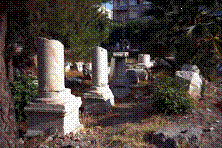 Columns
from the colonnaded road and its portico.
Columns
from the colonnaded road and its portico.

 The
coins from Thyatira shown above convey a sense of prosperity. The image on the
left emphasizes fruitfulness.
The
coins from Thyatira shown above convey a sense of prosperity. The image on the
left emphasizes fruitfulness.
Images on the right weave together images of serpents. The coins from Thyatira
shown above convey a sense of prosperity. The image on the
left emphasizes fruitfulness. Images on the right weave together images of serpents.
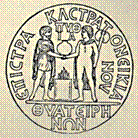 The
principal deity of Thyatira was Apollo Tyrimnaeus.
The titles given to the deity associate him with the power
The
principal deity of Thyatira was Apollo Tyrimnaeus.
The titles given to the deity associate him with the power
of the sun. In the picture shown here, the god stands on the right, shaking
hands with the emperor. The god holds a battle ax to show his power
in war. Here the Emperor and the god of Thyatira support the Imperial Trimnean
Pythian Games with their hands joined together.
Geographically:
The city of Thyatira was situated midway in a long valley which extends north
and south connecting the Hermus and Caicus valleys. It was about
40 miles south east of the city of Pergamum. Thyatira was built in a relatively
flat area with no hill for an acropolis. The combination of a low
plateau for an Acropolis and the sloping valley surrounding it, gave an impression
of the city as more cosmopolitan and open, as opposed to
the more austere cliffs at Pergamum. It was located in a very rich agricultural
area. Because it was located in a valley connecting two other valleys,
it lacked natural fortifications to protect it from invasion.
Historically:
Thyatira was founded by one of Alexander the Great's successors, Seleucus,
as a military outpost guarding the north-south road. For defense this colony
of Macedonian soldiers were planted at Thyatira between 300 and 282
B.C. It therefore became an important garrison city . Thyatira became known
as the gateway to Pergamum. The task for those stationed at Thyatira
was to delay an attacker and buy time for Pergamum. Because of its geographical
weakness, Thyatira was repeatedly destroyed. In 190 B.C. it fell
to the Romans and formed part of the province of Asia. After Roman control,
the city became a flourishing commercial center.
Culturally:
Population wise, the city (also the church) was predominantly Gentile in composition.
The city was primarily made up of those of Macedonian descent, but still
there was an amalgamation of nationalities there due to its military and commercial
history. There is no mention of the Jewish element in Thyatira.Thyatira
was the smallest of the seven cities addressed in Revelation.
Economically:
Commercially, the period of increase and prosperity had just begun when the
letter to the seven churches was written.
Thyatira still possessed strong and vivid memories of her military origin even
though her fortifications had decayed and been dismantled.
Thyatira became a major center of communication. Its location was no longer
a liability but became an asset. It connected Pergamum with
Laodicea, Smyrna, and the interior regions of the province of Asia. As a result
many people passed through Thyatira and it became a major
commercial district.
Trade guilds arose in greater numbers than in any other city.
There were guilds there for wool workers, linen workers, makers of outer garments,
dyers, leather workers, tanners, potters, bakers,
slave dealers, and bronze smiths.
It was said: "if you wish to get ahead in this world , you must belong to a
guild."
The foremost guild was the dying and manufacturing of woolen goods.
Lydia probably represented her guild in Philippi (Acts 16:14), showing that
Thyatira's market extended across the Aegean Sea to mainland Greece.
Religiously:
Unlike Pergamum and Smyrna, Thyatira was not an important religious center.
The primary god worshiped by the Thyatrians was the Greek sun god, Apollo.
Emperor worship did not exist in the city of Thyatira.
A hero Tyrimnos represents the Thyatiran conception
of the city's function in the world.
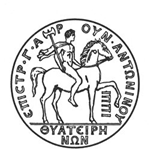
He goes forth on horseback with the
battle-axe over his shoulder, the fit representative of a military colony, to
conquer,
and to dash his enemies in pieces. This hero Tyrimnos is closely related in
nature to the tutelary god of Thyatira, whose
full titles are recorded in inscriptions: he was styled Propolis because he
had his temple in front of the city, Propator as the divine ancestor
(doubtless both of the city as a whole and specially of some leading family
or families), Helios the sun-god, Pythian Tyrimnaean Apollo,
a strange mixture of Hellenic and Anatolian names. This god is never named on
the coins, so far as published; but he often appears as a
type on them, a standing figure, wearing only a cloak (chlamys) fastened with
a brooch round his neck, carrying a battle axe over one shoulder,
and holding forth in his right hand a laurel-branch, which symbolises his purifying
power. This elaborate and highly composite impersonation of the
Divine nature, with so many names and such diversity of character, seems to
have been produced by a syncretism of different religious ideas in
the evolution of the city. To hold a job or run a business in Thyatira, it was
necessary to be a member of a guild. Each guild had its own patron diety.
The members of the guild were expected to attend the guild festivals and to
eat the food, part of which was offered to the patron deity.
After the feast with meat sacrificed
to idols ended, the activities characterized by gross sexual immorality began.
To walk out on such activity would
make one an object of ridicule and persecution. A faithful Christian may have
found it difficult to live his faith, as well as practice his craft.
Christians faced the dilemma of attending those feasts or possibly losing their
livelihood. How some in the church at Thyatira were handling the
situation caused the Lord Jesus great concern.
The Church in Thyatira:
The Bible does not record the founding of the church at Thyatira, Pergamum or
Smyrna.
According to Acts 16:14, 'A woman named Lydia, from the city of Thyatira, a
seller of purple fabrics, a worshiper of God,' was converted under
Paul's ministry at Philippi. Verse 15 records that members of her household
were also saved and may have helped start this church.
Probably the church was founded
as an outreach of Paul's ministry at Ephesus (Acts 19:10).
Thyatira in Church History About 150 AD, Montanus began a cult practice from
Thyatira, claiming his prophetesses spoke with the voice of the
Holy Spirit (hence, Montanism).
A faithful Christian may have found it difficult to live his faith, as well
as practice his craft.
Archeology
Thyatira's ancient ruins were left untouched until Rustem Duyuran began to excavate
the site from 1968 to 1971.
Numerous inscriptions were found (21 sent to Manisa Museum), along with the
location of the colonnaded stoa and other public buildings.
The Thyatiran Bronzesmith
The divine smith, Hephaestus, dressed as a workman, is here seated at an anvil
(represented only by a small pillar),
holding in his left hand a pair of forceps, and giving the finishing blow with
his hammer to a helmet, for which the goddess of war, Pallas Athene,
is holding out her hand.
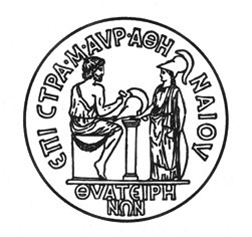
Considering that a guild of bronze-smiths is mentioned at Thyatira, we cannot
doubt that this coin commemorates the peculiar importance for the welfare of
Thyatira of the bronze-workers' handicraft; and we must infer that bronze work
was carried to a high state of perfection in the city.
The alliance of Smyrna and Thyatira
On this coin the Amazon Smyrna, the mythical foundress of the ancient Aeolic
city, armed with the Amazons' weapon, the double-axe, wearing the short
tunic and high boots of the huntress and warrior, holds out her right hand to
greet the peaceful figure of Thyatira, who is dressed in the long tunic and
mantle (peplos) of a Greek lady, and rests her raised left hand on a sceptre.
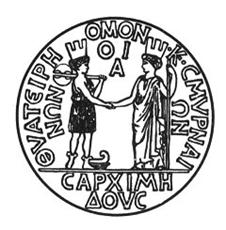
Both wear the mural crown, which indicated the genius of a city. Behind the
foot of Smyrna appears the prow of a ship.
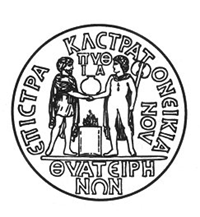 The
emperor (left) and the deity of Thyatira (Apollo Tyrimnos) were both called
the sons of Zeus.
The
emperor (left) and the deity of Thyatira (Apollo Tyrimnos) were both called
the sons of Zeus.
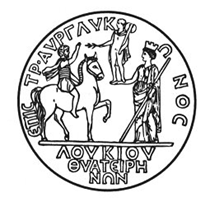 The
emperor (son of the deity), the deity of Thyatira, and Thyatira
The
emperor (son of the deity), the deity of Thyatira, and Thyatira
2:18 “To the angel of the church in Thyatira write:”
2:18 “These are the words of the
Son of God, whose eyes are like blazing fire and whose feet are like burnished
bronze.”
“Son of God” is used only here in Revelation.
In 1:13 he is called the “son of man” from Daniel 7:13.
Jesus stands in contrast to the local deity Apollo Tyrimnos (God) and the emperor
(Apollo incarnate)
Both Apollo Tyrimnos and the emperor where known as “sons of Zeus.”
The emperors where known to be adopted sons of the God.
Later Psalm 2:9 is quoted to the
church of Thyatira.
In Ps. 2:7 it says: “He (the Lord) said to me, ‘You are my Son; today I have
become your Father.’ ”
- this is a reference to the Lord Jesus entering the office of the Messiah and
thus entering into a new relationship with God the Father.” (Acts 13:33)
Jesus receives the right to the Messiah inheritance because he was anointed
by God and fulfilled the work. Thyatira stands in a similar position before
the Messiah now.
Jesus says his “eyes are like blazing
fire” and his “feet are like burnished bronze.”
Like all the letters he takes imagery from the original vision that John saw
in chapter one.
Blazing Eyes refer to the penetrating power for judging in absolute truth.
Nothing is hidden.
Feet of burnished bronze speaks of his ability to judge and rule the nations.
(Rev.19:15)
Bronze is a symbol for judgment of sin as is seen in the tabernacle altar and
bronze basin.
John 5:27, “And he has given him authority to judge because he is the Son of
Man.”
2:19 “I know your deeds, your
love and faith, your service and perseverance, and that you are now doing more
than you did at first.”
“Deeds” is erga “erga” where we get our
word “energy” and refers to works.
God does not overlook our deeds.
“God is not unjust; he will not forget your work and the love you have shown him s you have helped his people and continue to help them.” Hebrews 6:10
“Do not be deceived: God cannot be
mocked. A man reaps what he sows The one who sows to please his sinful nature,
from that nature will reap destruction;
the one who sows to please the Spirit, from the Spirit will reap eternal life.
Let us not become weary in doing good, for at the proper time we will reap a
harvest
if we do not give up.” Galatians 6:7-9
Love agaphn
Faith pistin
Service diakonian get the word “deacon”
and means “ministry, service”
Perseverance upomonhn “means patience endurance”
Love and Faith are motives for action.
Service and Perseverance are action that result from inside.
First church to be commended for love.
1 Thessalonians 1:3, “your work (ergou)
produced by faith (pistis), your labor prompted by
love (agape), and your endurance (upomone)
inspired by
hope in our Lord Jesus Christ.”
Paul tells Timothy that "the goal of this command is love, which comes from a pure heart and a good conscience and a sincere faith." (I Tim. 1:5).
These were qualities which were present
in Thyatira, and the Lord commends them for it.
- “command” is the word for “instruction”
- “pure heart” refers to the
mind, the soul, the seat of the emotions, will and decisions.
This is where the Christian sets their moral compass which guides their life.
To grow as a Christian you must be doing what you know is right. If you do what
you know to be right you have a “pure heart.”
Romans 13:5, “It is necessary to submit to the authorities, not only because of possible punishment but also because of conscience.”
1 Corinthians 8:10 the conscience guides your life. “For if anyone with a weak conscience sees you who have this knowledge eating in an idol’s temple, won’t he be emboldened to eat what has been sacrificed to idols? . . You wound their weak conscience.”
- “good conscience” indicates
“self-judgment”
Bad teaching can re-set the moral compass of the pure heart and produce a “bad
conscience” which is trying to go North while walking South.
They have to become hypocrites in their lifestyle and their faith can not be
sincere.
“Such teachings (that has abandoned the faith) come through hypocritical liars, whose consciences have been seared as with a hot iron.” 1 Tim.4:1,2
“To the pure, all things are pure,
but to those who are corrupted and do not believe, nothing is pure. In fact,
both their minds and consciences are corrupted.
They claim to know God, but by their actions they deny him. They are detestable,
disobedient and unfit for doing anything good.” Titus 1:15,16
- opposite of pure
- they do not believe (do not have truth to set moral compass in line with the
Spirit)
- their minds and consciences are corrupt
- they claim faith, but their actions are hypocritical This person is detestable
on the inside, disobedient on the outside, and can not produce anything good
in line with God’s plan.
- “sincere faith” means “without
hypocrisy” is faith that really trying to pursue God and not just act it out.
It is someone who really wants to grow, to know God,
to become what they were created for. Anything less than this is “hypocritical
faith.”
How it works
1) Word is Taught
2) A person seeking God , accepts compass of the Spirit, they follow the compass/Spirit
3) Love is produced
“seeking God” is sincere faith
“compass” is pure heart
“compass/Spirit” is clear conscience
2:19 "Doing more than you did at first.”
“For if you possess these qualities
in increasing measure, they will keep you from being ineffective and unproductive
in your knowledge of our Lord Jesus
Christ.” 2 Peter 1:8
This signifies growth that comes
from staying focused on:
1) The bread of life. . .the truth. (the present)
2) The eternal life. . . .the reality. (the future)
- Ephesus had the truth, but
did not have the love.
Jesus said he was with them, so relax.
- Smyrna had the purity,
but they had fear.
Jesus told them to focus on the future
- Pergamum knew reality,
but compromised truth.
They need to apply the truth today
- Thyatira had the word, the fruit and growth, but. . .
2:20 “Nevertheless, I have this
against you: You tolerate that woman Jezebel, who calls herself a prophetess.”
The church is guilty of one sin, they tolerate Jezebel. They are letting her
teach as a prophetess.
“Tolerate” is the Greek word afiemi “aphiemi” which means "to tolerate, permit,
leave alone, allow, forbid not."
This word appears in the Present Tense in this passage which signifies this
was happening continuously.
They permitted the destructive influence of this person to continue unchecked!
Thyatira was aware of a destructive force within its midst, but lacked the spiritual
courage to confront false teaching and strong personalities. Jezebel was wife
of Ahab (869-850 BC) Daughter of pagan Phoenician King Ethbaal, the king of
Tyre and Sidon She influenced Ahab towards Baal worship Her influence eventually
made Baal worship the national religion 1 Kings 18-21 and 2 Kings 9 She killed
prophets of Baal and intimidated Elijah Supported 450 prophets of Baal and 400
prophets of Asherah She had Naboth killed for his vineyard Jehu destroyed the
house of Ahab and had Jezebel “cast” out of a window to be eaten by dogs in
fulfillment of Elijah’s prophecy. Historical Background for Baal Worship Genesis
10:8, Nimrod Cush was Nimrod’s father. Either: 1) Cush married Semiramis and
they had a son named Nimrod 2) Nimrod’s wife was Semiramis and they had a son
named Tammuz Either way Nimrod eventually married Semiramis, maybe his mother.
Nimrod was a mighty hunter and an empire builder that united the world at this
time. Nimrod ruled the ancient land of Babylon. His beautiful wife ruled with
him. Nimrod died at the height of his power. Semeramis helped deify him in the
minds of the people by saying he rose into the sun. “Nimrod's spirit had ascended
into the sun itself, she claimed. With breathtaking eloquence she described
to the people his new and elevated role as their benefactor and protector. Each
morning he would rise, bringing light and life to the land as he traveled across
the sky. In the evening he would plunge below the edge of the earth to battle
the subterranean evil spirits and demons that would otherwise crawl over and
annihilate mankind. At times the battle would be bloody, and the red-streaked
sky bore witness to the fray. Each morning the people were to lay their offerings
before the rising sun and worship it as their departed leader and victorious
protector.” The first day of the week would be dedicated to the worship of the
sun-god, and in like manner the rest of the weekdays would be dedicated to worship
of the lesser heavenly bodies. Today the days of our week still have within
them the names of these lesser gods that followed: The first day of the week
remains Sunday; Monday commemorates the moon; Tuesday, the planet Mars (Tiu);
Wednesday, Mercury (Woden); Thursday, Jupiter (Thor); Friday, Venus (Frigg or
Freya); Saturday is obviously named for Saturn. Semeramis conceived another
child saying Nimrod’s sun rays had impregnated her The child was called Tammuz
an immaculate conception and reincarnation of Nimrod On December 25 Tammuz,
the child of the sun-god, was born. Falling as it did during the slowly lengthening
days immediately after the winter solstice, it was also seen as an omen of the
sun's rebirth.1 December 25 was thereafter observed as the birthday of the son
of the sun-god, and became a yearly feast day throughout the kingdom. Semeramis
called Tammuz the savior, but it was she that was deified. So, Nimrod produced
himself in the image of a son, who was the savior. Tammuz and his mother Semeramis
where honored as the mother/son deity It was a pagan trinity Nimrod/Semeramis/Tammuz
Men began to worship a divine mother and god-child. The legend appears in different
cultures, under different names Ashteroth in Israel {Jeremiah 44:17-19.}
, Isis in Egypt, Indrani in India, Cybelle in Asia, Ceres in Greece, Shing Moo
in China, Hertha in Germany, Sisa in Scandanavia. In his deified form, Nimrod
the Sun god is known as Baal. Semiramis, as the female divinity, would be called
Baalti. This word translated into English means "My Lady." In Latin it would
be translated "Mea Domina". This name becomes the name "Madonna" The winter
solstice was the time when the sun was thought to be "reborn", so December 25th
was a celebration of Baal Ezekiel 8 13 - 16 ..Again, he said, "You will see
them doing things that are even more detestable." 14 Then he brought me to the
entrance to the north gate of the house of the LORD , and I saw women sitting
there, mourning for Tammuz. 15 He said to me, "Do you see this, son of man?
You will see things that are even more detestable than this." 16 He then brought
me into the inner court of the house of the LORD , and there at the entrance
to the temple, between the portico and the altar, were about twenty-five men.
With their backs toward the temple of the LORD and their faces toward the east,
they were bowing down to the sun in the east. Tammuz is also the Babylonian
name for a month and was adopted by the Hebrews, as are all of the names of
the months in the Hebrew Calendar. Tammuz is the 4th Month. Kabbalah is Jewish
mysticism. The Kabbalah refers to the Month of Tammuz as The Month of Hidden
Light . “Tammuz was reputed to have been a great hunter. Perhaps his greatest
conquest of all, however, was his mythical union with Ishtar, the mother goddess
who embodied all the reproductive energies of nature. Also variously regarded
as the moon goddess and the queen of heaven, Ishtar was the principal female
deity of the Assyrians. This same goddess, with certain variations, can be identified
in other cultures as Ashtoreth (Phoenecian), Astarte (Greek and Roman), Eostre
(Teutonic), and Eastre (Saxon). Her counterpart in Egypt was Isis, wife and
sister of Osiris and mother of Horus. Rabbits and eggs were both symbols of
life and fecundity that early came to be identified with Ishtar. The yearly
celebration honoring her took place around the first full moon after the spring
equinox, when all of nature seemed to be bursting with reproductive vitality.
Unfortunately, the youthful Tammuz (also known as Adonis, meaning "lord," in
classical mythology) met an untimely death at the tusk of a wild boar. Here
legend overtakes history altogether. Some accounts say that after three days
Tammuz miraculously resurrected himself; others say that the grief-stricken
Ishtar journeyed far into the netherworld to find him. After many days she succeeded,
but during her absence the passion of love ceased to operate and all of life
on earth languished in mourning. By all accounts, when the lamenting was over,
Tammuz was firmly ensconced as the new god of the sun, and his renown eventually
exceeded even Nimrod's. Every year following Tammuz' tragic death and presumed
ascension to the sun, the forty days preceding Ishtar's festival were set aside
for fasting and self-affliction to commemorate his suffering and death. (It
was this practice, "weeping for Tammuz," that God called an abomination in Ezekiel
8:13, 14.) At the end of this period of mourning the people would waken early
on the first day of the week and travel to the highest hills near their homes.
There they would present their offerings of wine, meat, and incense and prostrate
themselves before the rising sun, exclaiming "Our lord is risen!" Then would
commence the festivities of Ishtar, queen of heaven and goddess of fertility.
In preparation for this high celebration, the people would make small cakes,
inscribing them with a cross (a pagan fertility symbol), for baking in the sun
and eating as part of their ritual. The day would conclude in orgiastic revelry
of a most debasing sort, and often included human sacrifices. Some of the most
prominent Canaanite gods were: • Baal -- of the Philistines (known as Merodach
by the Babylonians): Baal, known as the Lord of Heaven, was worshiped by both
ritual immorality and child sacrifice (II Kings 16:7, 21:6). These acts were
supposed to cause Baal to bestow prosperity upon his worshipers. • Ashteroth
-- goddess of the Philistines (known as Ishtar in Babylon and Venus in Greece):
Ashteroth was worshiped by ritual immorality; both men and women paid temple
prostitutes for their immoral acts. Ashteroth would then bless the crops and
grant fertility to the women (who could then keep the children or sacrifice
them to Baal as they chose). Consumption of alcohol was also part of the worship
ceremonies. • Chemosh -- national god of the Moabites: Chemosh was especially
worshiped by child sacrifice, primarily the offering of a first-born son (II
Kings 3:26-27). Contrast this with Christian teaching. Humans must offer their
first-born son to satisfy the power of Chemosh; Jehovah offered his only begotten
Son to satisfy His sense of holiness of us. • Molech -- national god of the
Ammonites (also known as Milcolm): Molech was worshiped by offering children
as burnt sacrifices -- the children of Israel were especially warned about the
religion of Molech (Leviticus 18:20-21 and 20:2-5). David has often been criticized
for making the Ammonites pass through the fires of their own brick-kilns after
he conquered Ammon (II Samuel 12:30-31). But it should be remembered that these
were the same brick-kilns in which they had burned their children. This punishment,
harsh as it was, was just. • Dagon -- another god of the Philistines, considered
to be half man-half fish: Dagon was worshiped by drunkenness and acts of violence
and rape against non-Philistines. It was the statue of Dagon that was destroyed
when the Ark of the Covenant was placed in the same building with it (I Samuel).
A New Testament Jezebel would have been: Teaching Called a prophetess A leader
Strong personality A Woman Accepted as a woman Unteachable Misleading people
Active in the church Used by Satan Void of understanding truth There are several
theories as to the identity of "the woman Jezebel": 1) The wife of one of the
elders. The Greek word for "woman" and "wife" is the same word. In some ancient
manuscripts the word "your" is found here, making the phrase read "your woman/wife
Jezebel." This has led some to assume that Jesus is referring to the wife of
one of the leaders. 2) The famous local prophetess at the shrine of Sambathe.
(A female oracle called the Sambathe presided over a lucrative fortune-telling
business. The preoccupation with female religion may have been an influence
on this church, as it allowed the corrupt ministry of Jezebel.) 3) Lydia. "It
has been suggested that, when Lydia returned to Thyatira, she found her Christianity
clashing with her business interests and urged the church to the way of compromise
and accommodation. That theory is merely a slander on Lydia!" (William Barclay,
Letters To The Seven Churches, p. 60). 4) The name is merely symbolic, and does
not refer to any one person but to a "corrupt faction" within the congregation
(J.T. Hinds, p. 51). 5) A real woman in the congregation. Her real name may
have been Jezebel, or she may have been called "Jezebel" because she exhibited
qualities similar to the Jezebel of the OT. This view seems to be the most likely.
2:20 “By her teaching she misleads my servants into sexual immorality and the eating of food sacrificed to idols.”
2:21 “I have given her time to
repent of her immorality, but she is unwilling.”
Notice God has given her “time” from the word “cronon” (chronon) and means “space,
time” “But she is unwilling” is literally “she wishes not to repent” “wishes”
is “qelei” and means “to desire” is in the: present tense meaning it is happening
right now Active voice meaning she is doing the action Indicative mood is the
mood of reality So, this means, that right now she is actually herself not wanting
to repent. “Immorality” means “wanton behavior, including fornication”
2:22 “So I will cast her on a bed
of suffering, and I will make those who commit adultery with her suffer intensely,
unless they repent of her ways.”
“Cast her on a bed of suffering” “Cast” is “ballw” where we get our word for
ball. Just like Jezebel was thrown out or the palace to the ground Cast is
interestingly in the present tense indicating the how sure this future event
will happen. “Bed of suffering” is opposite of the “bed of luxury” where immorality
occurred. “Unless” is in the third condition of “if” in the Greek “ean” and
indicates possibility, but in this verse it is highly probable.
Notice:
1) Jezebel’s punishment is sure; it is spoken in present tense of a future event.
2) Those who commit adultery with her are threatened with the third class “if”
Jezebel is surely judged; followers still have time to repent.
Four Groups of People Here:
1) Jezebel
2) Those who commit adultery with her
3) Her children
4) The church(es)
Punishment for each:
1) Jezebel— “bed of suffering”
2) Those who commit adultery with her— “suffer intensely”
3) Her children— struck “dead” This church was about 40 years old. This practice
had been going on so that their was now a group with in the church that had
joined the church because of this practice. They were not the spiritual children
of the gospel, but the spiritual children of Jezebel’s doctrine.
The Lord would select the false believers in the church and strike them down.
It would purify this local church.
4) Churches— “they will know that I am he that searches hearts and minds” The
Lord had to do all this because the church tolerated Jezebel. The church failed,
but was taught a lesson in reality through their failure.
Conditions of “if” in the Greek:
First Class. . . . . . “If and it is true” (Mt. 4:3; 1 Cor. 15:2)
Second Class. . . “If and it is not true” (Lk 7:39; Mt.11:21; 33:30; 1 Co. 2:8)
Third Class. . . . . “If and I do not know (Mt. 4:9, “may be you will, maybe
you wont’” This is the class of hypothetical cases.”
Fourth Class. . . . “If and I wish it were true but it is not” (Lk. 22:67 “I
wish you would but you won’t”)
2:23 “I will strike her children
dead. Then all the churches will know that I am he who searches hearts and minds,
“strike children dead” literally says, “kill them with death” Jesus Christ
is very serious about: 1) Doctrinal Purity 2) Lifestyle Purity Jesus will take
the lives of false teachers to protect his church Jesus will also allow false
teachers to continue to test the hearts of professing believers and strengthen
the faithful. Jude 4 “For certain men whose condemnation was written about long
ago have secretly slipped in among you. They are godless me, who change the
grace of our God into a license for immorality and deny Jesus Christ our only
sovereign and Lord.” 2 Peter 2:1 “But there were also false prophets among the
people , just as there will be false teachers among you. They will secretly
introduce destructive heresies, even denying the sovereign Lord who bought them—bringing
swift destruction on themselves.” Matthew 13:30, “Let both grow together until
the harvest.” 2:23 “and I will repay each of you according to your deeds.” Jeremiah
17:10 “I the Lord search the heart and examine the mind, to reward a man according
to his conduct, according to what his deeds deserve.” Matthew 16:27 “For the
Son of Man is going to come in his Father’s glory with his angels, and then
he will reward each person according to what he has done.” Romans 2:6 “God ‘will
give to each person according to what he has done.’ ” (Ps.62:12; Prov. 24:12)
2:24 “Now I say to the rest of
you in Thyatira, to you who do not hold to her teaching and have not learned
Satan’s so-called deep secrets (I will not impose any other burden on you):
Notice Jesus recognizes a group he identifies as “the rest of you.” These are
they who have not: Held to Jezebel’s teaching Learned Satan’s so-called deep
secrets Read Malachi 3:16-17 about those who the Lord recognized as different
than those who would be judged. 2:25 “Only hold on to what you have until I
come.”
2:26 “To him who overcomes and
does my will to the end, I will give authority over the nations—” 2:27 “ ‘He
will rule them with an iron scepter;
he will dash them to pieces like pottery—’ "
2:27 “just as I have received authority from my Father.”
2:28 “I will also give him the
morning star.”
The reward of the morning star may be a reference to a local Thyratira concept
whose meaning has been lost in time. A variety of meanings for “the morning
star” reward are: A reference to Lucifer from Isaiah 14:12 A reference to Christ
from Rev. 22:16 and 2 Peter 1:19 A reference to the believers in eternity from
Daniel 12:3 The beginning of eternal life A reference to the planet Venus (the
Babylonian star of Ishtar) The Holy Spirit A connection to Numbers 24:17 through
Psalm 2:7-9 since both speak of the rod or scepter of the ruler The morning
star is at least a reference to the image of Jesus Christ and relates to us
when we mature into his likeness. Just like we will rule with him if we do his
will, we will look like him in eternity. We will participate in the glory of
Christ which may be what the morning star is referring to.
2:29 “He who has an ear, let him hear what the Spirit says to the churches.”